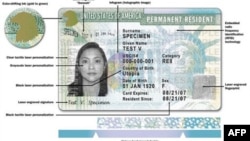A green card is a U.S. identification document, so called because of the green color of the original version of the document. The card is proof that its holder is a lawful permanent resident and is authorized to live and work in the United States.
There are a number of ways by which non-U.S. citizens may obtain green cards. Many people become permanent residents through family members. Applicants may be eligible if they are an immediate relative of a U.S. citizen. This includes spouses, unmarried children under the age of 21, and parents of U.S. citizen petitioners 21 years or older. Family members of a green card holder may also be eligible. Also eligible are persons in special categories such as non-immigrant widows or widowers of U.S. citizens.
Many people become permanent residents through a job or offer of employment. Some categories require certification from the U.S. Department of Labor to show that there are not enough U.S. workers who are able, willing, and qualified in the geographic area where the immigrant is to be employed and that no American workers are displaced by foreign workers. In other cases, highly skilled workers, those with extraordinary ability in certain professions and investors/entrepreneurs are given priority to immigrate through several immigrant categories.
Green cards may also be obtained through refugee or asylee status. Refugees are required by U.S. law to apply for permanent resident status one year after being admitted to the United States.
Each year, about 50,000 immigrant visas are made available through the Diversity Visa program, also known as the Green Card Lottery, to people who were born in countries with low rates of immigration to the U.S. Lottery applicants can only qualify by country of birth, not by citizenship. Anyone selected under this lottery is given the opportunity to apply for permanent residence. They can also file for their spouse and any unmarried children under the age of 21.
Applicants should be aware of fraud schemes, in which false agents solicit money from applicants by promising to submit applications for them. Applicants are advised to use only U.S. official government websites, in which the URL ends in .gov and beware of email solicitations for money or so-called “processing fees.”
The United States is a nation of immigrants and continues to welcome those who seek to make America their place of work and their home.
There are a number of ways by which non-U.S. citizens may obtain green cards. Many people become permanent residents through family members. Applicants may be eligible if they are an immediate relative of a U.S. citizen. This includes spouses, unmarried children under the age of 21, and parents of U.S. citizen petitioners 21 years or older. Family members of a green card holder may also be eligible. Also eligible are persons in special categories such as non-immigrant widows or widowers of U.S. citizens.
Many people become permanent residents through a job or offer of employment. Some categories require certification from the U.S. Department of Labor to show that there are not enough U.S. workers who are able, willing, and qualified in the geographic area where the immigrant is to be employed and that no American workers are displaced by foreign workers. In other cases, highly skilled workers, those with extraordinary ability in certain professions and investors/entrepreneurs are given priority to immigrate through several immigrant categories.
Green cards may also be obtained through refugee or asylee status. Refugees are required by U.S. law to apply for permanent resident status one year after being admitted to the United States.
Each year, about 50,000 immigrant visas are made available through the Diversity Visa program, also known as the Green Card Lottery, to people who were born in countries with low rates of immigration to the U.S. Lottery applicants can only qualify by country of birth, not by citizenship. Anyone selected under this lottery is given the opportunity to apply for permanent residence. They can also file for their spouse and any unmarried children under the age of 21.
Applicants should be aware of fraud schemes, in which false agents solicit money from applicants by promising to submit applications for them. Applicants are advised to use only U.S. official government websites, in which the URL ends in .gov and beware of email solicitations for money or so-called “processing fees.”
The United States is a nation of immigrants and continues to welcome those who seek to make America their place of work and their home.















